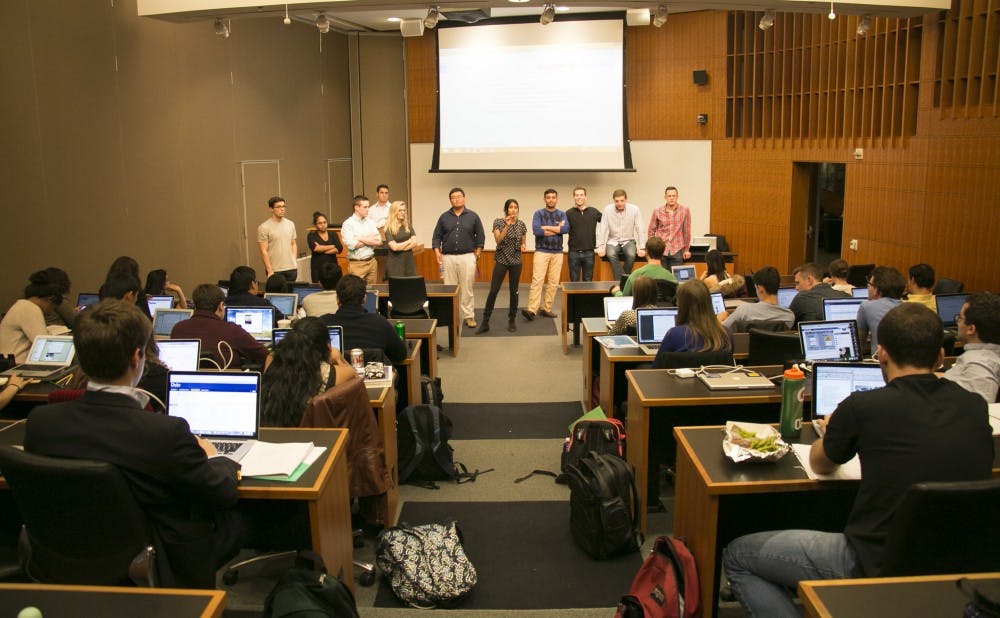Duke Student Government approved the budget for the 2015-16 academic year after several hours of debate in a meeting Wednesday.
The budget—which is funded by $470,000 from student activities fees—pays for the expenditures of many student groups. It is written by the Student Organization Funding Committee after it hears the funding requests of around 100 groups. DSG Senate approved the budget unanimously after hearing several amendments.
“Relatively speaking, this year was a light year [for the budget process],” said Executive Vice President Abhi Sanka, a junior. “In previous years, we’ve had groups physically come in during public forum and make claims as to why they should have their allocations changed.”
The Senate voted on several amendments to the budget, most of which received unanimous or nearly unanimous approval.
Some amendments, however, were debated on the floor. Fix My Campus—which received DSG affiliate status earlier this year—had requested an additional $10,000 to be put into the DSG legislative discretionary account for its use throughout the year. This request was turned down by SOFC.
The denial of funds occurred because FMC provided a lump sum request instead of an itemized list. FMC also receives less oversight than other groups because its decision-making process is less transparent than that of the DSG Senate, SOFC chair Davis Treybig, a junior, explained.
Junior JP Lucaci, vice president-elect for services and FMC director, and senior Cameron Tripp, senator for residential life and FMC project director, appealed the decision. They explained that FMC asked for a lump sum because its costs come up randomly throughout the year as students request that things be fixed around campus. They also argued that FMC is held accountable by the almost 3000 students who submit requests through its Facebook group.
The Senate ultimately approved the appeal, and FMC received the lump sum. This was possible in part because the DSG newspaper program received no new funding as it had enough roll-over from this year to cover next year’s expenses.
Another notable approved appeal included Latent Image, which publishes an annual photography journal. They received approximately $8500 after their appeal, up from the original $4500 allocation.
In other business:
SOFC approved several group funding requests: the Duke Consulting Club received $2850 for an interview workshop; FORM Magazine received $2320 for a party for a magazine release; Alpha Kappa Alpha sorority received $3420 for a charity gala; and the Duke Dance Council received $4422.35 for their fall showcase in August.
Additionally, SOFC approved three new groups: GenFKD, which will work to make economic and financial news more accessible to students; Girls Engineering Change, which will work to eliminate gender barriers in STEM fields; and Soccer Sin Fronteras, which will help underprivileged students in the Durham area develop their soccer skills.
Shepard Moyle, Trinity ‘84 and president of the Duke Alumni Association Board of Directors, spoke to the Senate about the alumni network’s recent activities. These include work on a social network for Duke graduates and students similar to LinkedIn, efforts to connect minority graduates to minority groups on campus and the creation of a new alumni and visitor center.
The DSG Research Unit presented the results of studies that it had completed. The first pertained to community and infrastructure in independent houses compared to selective houses. It found that selective and greek houses reported stronger community than those in independent houses. Additionally, Keohane and Wannamaker dorms had the highest ratings for amenities and infrastructure. Crowell and Craven had the lowest ratings.
DSGRU also presented a study about race and selective groups' recruitment, which found that white students are overrepresented in Interfraternity Council, Panhellenic Association and selective living group rush. The study also found that the odds of white participants receiving a bid after completing recruitment was higher for both IFC and Panhellenic Association.
Finally, DSGRU reported on two studies which it was unable to complete this year: one about equity in freshman meal plans, which was not completed because of the administration’s questions about student access to financial information, and another about curriculum review, which was set aside because a faculty-led review is already underway.
The Senate also passed a budgetary statute to allocate $10,000 from the surplus fund for a new kiln for the Arts Annex. The statute was introduced by Vice President for Services Billy Silk and Director of Arts Advancement Pranava Raparla, both juniors.
Another budgetary statute was passed allocating $3000 to fund t-shirts for the class of 2017’s academic homecoming. The class of 2017 did not receive t-shirts as is tradition because academic homecoming was not held this year. The statute was introduced by Vice President for Academic Affairs Ray Li, a senior, and Senator for Academic Affairs Kavita Jain, a sophomore.
Senator for Durham and Regional Affairs Nick Andrade, a junior, introduced a modification to SOFC by-law which will change the election process for the SOFC chair. The amendment will be heard again next week for its second reading.
Modifications to judiciary, senate and executive by-laws were tabled until next week. The three proposed modifications were introduced last week by Associate Justice Nikolai Doytchinov, a senior, and Executive Vice President-elect John Guarco, a sophomore.
Get The Chronicle straight to your inbox
Signup for our weekly newsletter. Cancel at any time.

